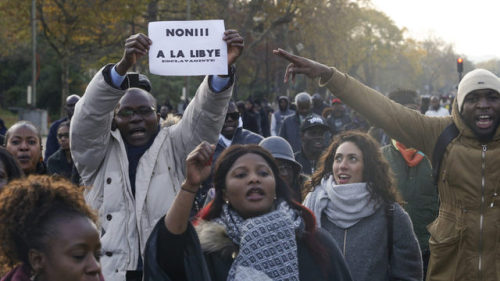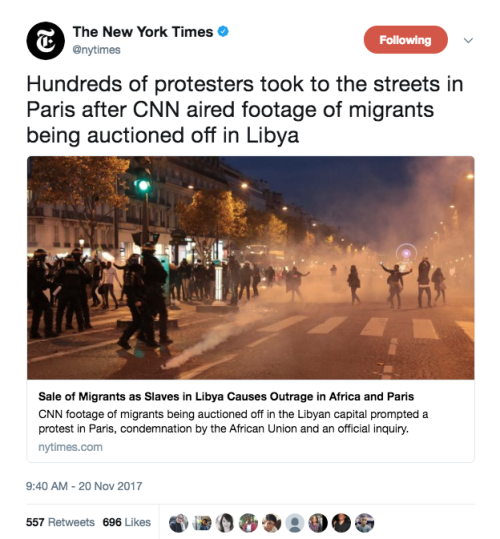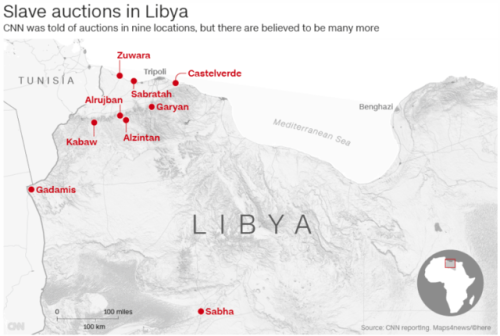thechanelmuse: thechanelmuse:Black Migrants Sold into Slavery in Libya for as Little as $400 &ldqu
thechanelmuse: thechanelmuse: Black Migrants Sold into Slavery in Libya for as Little as $400 “Eight hundred,” says the auctioneer. “900 … 1,000 … 1,100 …” Sold. For 1,200 Libyan dinars — the equivalent of $800. Not a used car, a piece of land, or an item of furniture. Not “merchandise” at all, but two human beings.One of the unidentified men being sold in the grainy cell phone video obtained by CNN is Nigerian. He appears to be in his twenties and is wearing a pale shirt and sweatpants. He has been offered up for sale as one of a group of “big strong boys for farm work,” according to the auctioneer, who remains off camera. Only his hand — resting proprietorially on the man’s shoulder — is visible in the brief clip. After seeing footage of this slave auction, CNN worked to verify its authenticity and traveled to Libya to investigate further. Carrying concealed cameras into a property outside the capital of Tripoli last month, we witness a dozen people go “under the hammer” in the space of six or seven minutes.“Does anybody need a digger? This is a digger, a big strong man, he’ll dig,” the salesman, dressed in camouflage gear, says. “What am I bid, what am I bid?” Buyers raise their hands as the price rises, “500, 550, 600, 650 …” Within minutes it is all over and the men, utterly resigned to their fate, are being handed over to their new “masters.” After the auction, we met two of the men who had been sold. They were so traumatized by what they’d been through that they could not speak, and so scared that they were suspicious of everyone they met. Crackdown on smugglers Each year, tens of thousands of people pour across Libya’s borders. They’re refugees fleeing conflict or economic migrants in search of better opportunities in Europe. Most have sold everything they own to finance the journey through Libya to the coast and the gateway to the Mediterranean. But a recent clampdown by the Libyan coastguard means fewer boats are making it out to sea, leaving the smugglers with a backlog of would-be passengers on their hands. So the smugglers become masters, the migrants and refugees become slaves. The evidence filmed by CNN has now been handed over to the Libyan authorities, who have promised to launch an investigation. First Lieutenant Naser Hazam of the government’s Anti-Illegal Immigration Agency in Tripoli told CNN that although he had not witnessed a slave auction, he acknowledged that organized gangs are operating smuggling rings in the country.“ They fill a boat with 100 people, those people may or may not make it,” Hazam says. “(The smuggler) does not care as long as he gets the money, and the migrant may get to Europe or die at sea.” “The situation is dire,” Mohammed Abdiker, the director of operation and emergencies for the International Organization for Migration, said in a statementafter returning from Tripoli in April. “Some reports are truly horrifying and the latest reports of ‘slave markets’ for migrants can be added to a long list of outrages.“The auctions take place in a seemingly normal town in Libya filled with people leading regular lives. Children play in the street; people go to work, talk to friends and cook dinners for their families.But inside the slave auctions it’s like we’ve stepped back in time. The only thing missing is the shackles around the migrants’ wrists and ankles. Deportation ‘back to square one’ One of the detained migrants, a young man named Victory, says he was sold at a slave auction. Tired of the rampant corruption in Nigeria’s Edo state, the 21-year-old fled home and spent a year and four months — and his life savings — trying to reach Europe. He made it as far as Libya, where he says he and other would-be migrants were held in grim living conditions, deprived of food, abused and mistreated by their captors.” If you look at most of the people here, if you check your bodies, you see the marks. They are beaten, mutilated.“ When his funds ran out, Victory was sold as a day laborer by his smugglers, who told him that the profit made from the transactions would serve to reduce his debt. But after weeks of being forced to work, Victory was told the money he’d been bought for wasn’t enough. He was returned to his smugglers, only to be re-sold several more times. The smugglers also demanded ransom payments from Victory’s family before eventually releasing him. “I spent a million-plus [Nigerian naira, or $2,780],” he tells CNN from the detention center, where he is waiting to be sent back to Nigeria. “My mother even went to a couple villages, borrowing money from different couriers to save my life.” Read more An article from The Telegraph posted months ago (May 9, 2017): Migrants in Libya forced by smugglers to kill sick or injured friends - by burying them alive Migrants in Libya have been forced by smugglers to bury alive fellow migrants who are too sick or injured to board boats setting off across the Mediterranean towards Italy, it was revealed on Tuesday. Migrants often spend months in Libya, held captive in squalid compounds or trying to earn enough money for their passage, and suffer knife and gunshot wounds at the hands of Libyan militia or ruthless gangs of traffickers. They are even sold as cheap labour in modern-day slave markets, humanitarian organisations say. If they are too badly injured to walk to the beaches from where the rubber dinghies set out or if they are perceived as being too much trouble because of illness, then they are killed, said Flavio Di Giacomo, spokesman for the International Organisation for Migration. “We have recently heard of cases where migrants who are wounded or sick have been buried alive by other migrants, on the orders of the traffickers,” Mr Di Giacomo told The Telegraph. “It’s horrific to think that traffickers can be so cruel. But they don’t care about the lives of migrants. If a migrant is a problem, they will kill them. A lot of migrants are shot dead on the beaches if they refuse to board the boats. It might be that they see the boats are overcrowded or the weather conditions are very bad. They are scared of the sea. A lot of these people come from small African villages and it’s the first time they have seen the sea.” A young Gambian migrant named Ousmane told IoM: “My friend got very sick in Libya. He was sick, but not dead. They buried him alive. They said he couldn’t have survived anyway. I heard him shout my name from the ground. I ran to him and saw them throwing dirt on top of him. I tried to save him, but they cut me with a knife.” Before they even reach the coast, some migrants are sold in slave markets held in town squares or car parks for the equivalent of £170 each, after which an even worse fate awaits them. Their new “owners” torture them in a bid to extract money out of their traumatized families back home, the IOM says. “Sometimes they are tortured while they are on the phone to their families, so that their relatives know they are suffering,” said Mr Di Giacomo. […] So far this year more than 43,000 migrants have been rescued at sea and brought to Italy, an increase of 38 per cent compared with the same period last year. The dramatic increase could be a result of smugglers’ fears that the Libyan Coast Guard is about to become more effective, having undergone months of intensive training by the EU. Traffickers are trying to put to sea as many migrants as they can because they fear a looming crackdown on their business, humanitarian groups say. The photo above is of migrants on a rubber dinghy awaiting to be rescued in the Mediterranean off the coast of Zawiya in Libya, in April 2017. Read more -- source link




